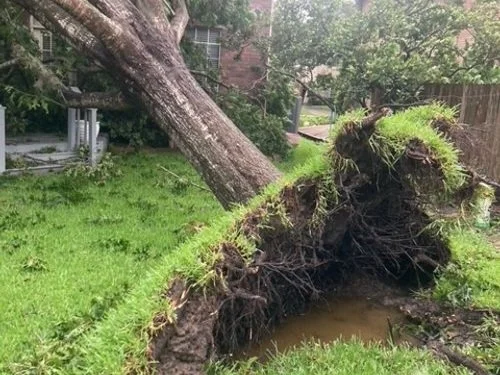When Trees Snap
Like trees in a storm, there’s only so much people can take before they snap.
My parents' tree, planted in memory of my grandfather, Poppy, after Hurricane Beryl
Hurricane Beryl came through this summer and toppled, cracked, or uprooted thousands of trees in the area. Most notably for me was the tree in my parents’ backyard, the one under which we had rested in the hammock and kicked the balls and pulled the wagon. That tree was pulled up out of the soggy ground and tipped over onto my parents’ house.
The randomness of hurricane destruction fascinates me. Why were the two live oaks in my front yard unaffected by Beryl, but the two trees across the street came down? Why was my fence left standing but the one at the end of the block was flattened like a pancake?
Beryl came ashore in Texas with sustained winds of 80 mph. By comparison, winds in Houston as I write this are a pleasant 15 mph, with gusts up to 27 mph. The trees today are fluttering in the wind, taking what they need from their environment and putting oxygen back out into the universe.
I’m curious, with regard to the trees — why do some snap and not the others? The angle or speed of the wind gust as it meets the tree? The condition of the wood? Too much moisture in the ground?
I’m curious, too, with regard to human behavior — what makes some humans snap and not others? What makes me able to handle something one day and lose my marbles the next?
Is it the timing of the insult as it comes from another person — does it enter a place of insecurity that houses an old childhood wound? Does it come from someone with whom I already have friction?
Is it the condition of the human — I’m certainly more likely to snap if I haven’t had rest, or if I’m not feeling well. If I’ve had a stressful day, I’m unable to tolerate any extra environmental offense from my family members. I am more likely to metaphorically topple over.
Years ago, my child, a teenager, got into the car after a hard day at school. I could read his stormy, sullen mood as soon as he sat down.
“So,” I started in, winds blowing. “I saw the grade on your math test.”
“Can we not talk about that? I had a pretty bad day,” my son answered.
“Sure,” I answered. And then a few blocks later, “I mean, if you would’ve studied, you definitely would’ve done better.”
“I asked if we could talk about it tomorrow. I had a really bad day,” my son tried again.
“Sorry, sure,” I said, and I promise I tried to let it go. I really did. But the hurricane winds were already picking up within me. “I told you that you’re going to have to study …”
“#%@&$!!!” he yelled, disrespectfully. “Can you ever shut up and leave me alone?” He snapped like a tree in a hurricane wind.
Now — here is where everyone will tell me I shouldn’t let my child talk to me like that, and don’t worry — I pulled over and yelled words he probably couldn’t absorb in his angry state. Don’t talk to me like that, and you can’t use that language, and all the things one says as a parent.
Fuming, we pulled into the driveway at home and turned the car off. He stomped off to his room and I stomped into the house, indignant and disrespected.
But as I folded laundry and reflected on the storm we had created, I realized I was the problem. He was handling his personal storm, his windy day, but I came in with energy that was the final gust of wind that made him crack. I had disrespected him first.
Even worse, he had asked me to back off. He had respectfully asked if we could talk about it later. And yet I pressed on. Relentless like the winds of a hurricane, I pressured and pressed him until he snapped.
Trees are, in many ways, symbolic of life, symbolic of our families. The Tree of Life, the family tree, and all that. We give our kids the roots they need for a good foundation. We give them rich soil in which to grow. Sunshine. A light breeze. Nestled in our thoughts, words and actions, they grow from seedlings to big strong trees.
As parents, we cultivate the environments and the weather of our homes — the surroundings in which our kids will flourish or fall. And sometimes we can create the storms they live in, too. When that happens, we cannot be surprised when they snap.
“Hey, I’m sorry,” I approached him later that day. “You asked me to back off and I just kept coming at you. This bad interaction is on me.”
“OK,” I think I received in return. Or maybe it was “whatever,” or just a blank stare. But the storm passed and the math test, now years later, didn’t even matter. I don’t even remember what class the test was in, much less the exam content.
We are all managing our own storms, especially our kids. Like the weather, we will have sunny and stormy days. Don’t make a hurricane-force wind for something that barely warrants a breeze. And when a storm brews, be sure to take a step back and ask yourself: are you making it better, or worse?
The advice and opinions herein are by no means meant to be a substitute for professional medical advice. Please contact your personal physician, mental health provider or health care professional for medical advice. Opinions are my own.

